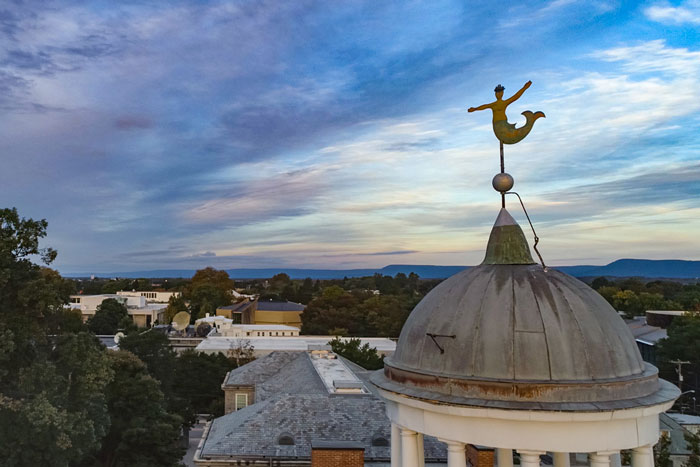Dickinson Receives $900,000 Grant from Andrew W. Mellon Foundation

New grant to support transformative initiatives in civic learning and action
by Christine Baksi
President Margee M. Ensign announced today that the college has been awarded a four-year, $900,000 grant by the Andrew W. Mellon Foundation to support transformative initiatives in civic engagement, including the establishment of the college’s new Center for Civic Learning & Action and the hiring of an executive director. A national search for the director is currently underway.
The center will allow faculty, students and community partners to work collaboratively, both locally and internationally, to better understand and address regional priorities and challenges. It also will expand community-based teaching and research opportunities; provide expertise and support for academic departments to meet learning goals for civic engagement; and ensure recognition of outstanding community engagement work by faculty, students and staff.
“We are faced with treacherously deep schisms in today’s world. Higher education institutions have a responsibility to bridge these gaps and to better serve their communities and the nation. As President Kennedy memorably observed, ‘what good is a private college or university unless it is serving a great national purpose?’ ” said Eugene Tobin, senior program officer at the Andrew W. Mellon Foundation. “Dickinson’s partnership with its neighboring community and its Center for Civic Learning & Action are clear examples of higher education serving the public good.”
“We are grateful for the Mellon Foundation’s support and thank them for recognizing the value of civic engagement through learning and action,” said Ensign. “We will continue to form strong community partnerships, address community-based issues and share our successes broadly so communities across the U.S. can learn how to harness the intellectual capital and creativity of their neighboring colleges and universities in addressing critical issues.”
The Mellon Foundation grant deepens Dickinson’s close integration of academics and community action—a longstanding characteristic of the college’s civic engagement work—by ensuring faculty involvement and curricular development continue to define the new center. It also allows the center to launch with a robust slate of new activities and extensions of existing partnerships.
One impressive example is the Carlisle Indian School Digital Resource Center (CISDRC), an online repository of documents and records from the former Carlisle Indian Industrial School (CIIS). More than 250,000 pages of documentation have been digitized with the help of Dickinson students. The CIIS, located near Dickinson, was founded in 1879 to “civilize” Native American children by teaching them to assimilate into European-American society. Over 39 years, the school enrolled some 10,000 students and served as the model for other off-reservation boarding schools across the U.S. and Canada. The goal of the CISDRC project is to make primary source documentation about the school easily accessible online and to provide resources for teaching. The project is based upon community reciprocity by encouraging “citizen archivists”—including the many descendants of CIIS students themselves—to contribute their own documents, photos, family stories and creative works to the digital site already created at Dickinson.
Other examples of the more than 45 existing partnerships the center will lead are two faculty-community Learning & Action Networks in support of meaningful, mutually beneficial, community-engaged research, teaching and learning—one focused on community health and another on North Carlisle neighborhoods, one of the most ethnically and racially diverse areas of Carlisle and the most economically disenfranchised.
Since Ensign began as president in July 2017, she has worked to make civic learning and action a distinctive pillar of a Dickinson education and raise the profile of civic engagement work. She created the President’s Commission on Community and Civic Learning & Engagement and the Community Advisory Council, a group of more than 30 private, public and nonprofit sector business leaders from Carlisle and neighboring communities who meet monthly to discuss priorities and plan joint projects. As a result of council discussions, a community-based research course was developed by Dickinson faculty members to gather data and effect local organizational capacity and decision-making and soon, a collaboration with the Carlisle Area School District will result in a locally developed approach to the Pennsylvania Department of Education’s mandate regarding assessments of civic education.
Dickinson has had a longstanding working relationship with the Mellon Foundation that includes significant past grants to establish the Center for Sustainability Education, enhance work in the digital humanities and expand civic learning and ethics across the curriculum.
Ensign said the vision for the Center for Civic Learning & Action and its mandate date back to the college’s founding in 1783 by Benjamin Rush, a signer of the Declaration of Independence. “Rush founded the college to provide a useful education focused on active engagement with the wider world. I’m proud to have an opportunity to amplify that mission under my presidency.”
Take the Next Steps
Published December 18, 2018